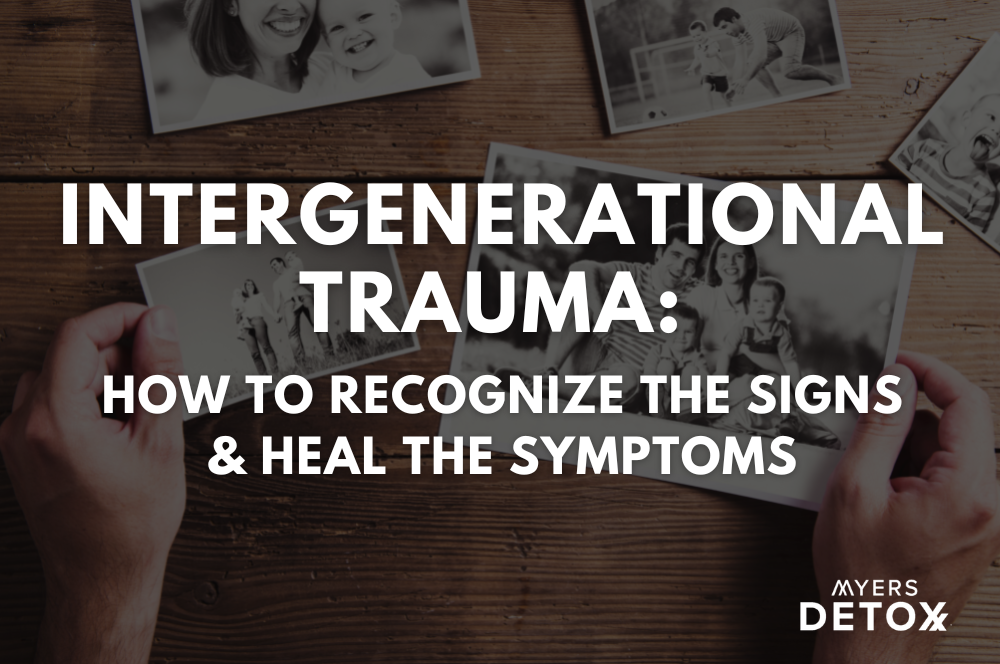Just as physical traits can be passed down through the generations, so too can traumatic responses. Learn more about intergenerational trauma, how it may be affecting you, and steps you can take to heal in this article.
Do you ever feel triggered around something for no apparent reason? Or perhaps you came into this life with a phobia or developed a fear that makes no logical sense?
These occurrences are more common than you might think, and although they may not make sense on the surface, there is a very logical explanation – intergenerational trauma.
When you inherit trauma from your parents, grandparents, and so on, it can live in your body and the energy field around your body and create havoc in your life without you even realizing it. In fact, many people with inherited trauma are so used to feeling fear and anxiety that they don’t even know there is a life beyond it. And they have no clue what is causing these feelings.
But what if you could wake up every day without nagging worries and fears holding you back? What if you could see through an optimistic lens without feeling as though the rug was going to be pulled out from underneath you?
In this article, you’ll learn:
- Why your unexplained anxiety can be due to someone else’s trauma
- How trauma can be passed down both behaviorally and genetically
- The evolutionary advantage to inherited trauma and how we’ve outgrown it
- How to stop the cycle of trauma and heal both yourself and your family line
What Is Intergenerational Trauma?
To understand intergenerational trauma, first, let’s examine what trauma is.
Trauma can mean a lot of different things, but at its core, a traumatic event is one that causes an intense emotional and physiological response that can be triggered well after the event has resolved. For example, someone who was assaulted or someone who grew up in a war torn country where food and safety were never guaranteed, so as adults they tend to hoard and are unable to relax and feel calm.
These are what you would refer to as “Big T” traumas because they are severe enough that the root cause is obvious. However, many people experience “little t” traumas that can be harder to pin down but are still quite impactful – they can be referred to as developmental trauma you suffered at the hands of your parents or primary caregiver.
In a trauma response, something in your environment triggers either a conscious or subconscious memory of the initial traumatic event, and you enter “fight or flight mode.” This is also known as your survival mode, and physiologically, it’s the activation of your sympathetic nervous system. This may look like sudden onset of anxiety and fear accompanied by your heart rate speeding up along with more shallow breathing.
Psychologically, in a trauma response, your attention becomes narrowed on the threat. It’s hard to think logically and creatively, and focusing on anything other than what triggered your trauma response can be difficult.
Many people that have been through a traumatic experience find that working with a professional counselor can be helpful as it brings more awareness to their triggers. However, in the case of intergenerational trauma, things can get a little tricky.
Intergenerational Trauma
Intergenerational trauma is trauma that you hold in your cellular memory that didn’t come from your direct experience but from the traumatic experiences of those in your family. Just like physical traits can be passed down through the generations, so too can traumatic responses.
In generational trauma, you will still experience the same anxiety and physiological responses that come with a trigger, but you won’t have any specific memory to tie your trigger back to.
How Generational Trauma May Affect You
Just like trauma experienced directly, generational trauma will have a unique impact on you as everyone is wired differently.

Some common symptoms of carrying generational trauma include:
- Hypervigilance
- Inability to trust people
- High anxiety
- Depression
- Panic attacks
- Nightmares and trouble sleeping
- Low self-esteem
- Social isolation
- Sensitive nervous system responses
Furthermore, when you’re in a trauma response, you’re turning on stress pathways in your body. Whether this is from a trauma you experienced directly, or generational trauma, the same stress hormones and pathways are activated, which can produce serious health issues in the long run.
Research shows that the stress that comes from trauma can set the stage for health conditions like heart disease, liver disease, autoimmune disease, cancer, depression, and more[1].
What Does The Research Say?
You wouldn’t be alone if you thought the concept of inheriting trauma seems a little out there. However, in the last several decades, more and more research has come out explaining how and why we pick up trauma from our family line.
The people most commonly studied regarding generational trauma are the children and grandchildren of holocaust survivors. One study showed that grandchildren of holocaust survivors were 300% more likely to engage in psychiatric counseling at some point in their lives than those who did not have holocaust survivors in their family, indicating that this group carried more emotional stress in general[2].
In another study, researchers examined the generational impact of the Holodomor genecide in Ukraine. The Holodomor genocide lasted from 1932 to 1933 and claimed millions of lives through forced starvation. The study found that the children and grandchildren of Holodomer survivors were living in the same “survival mode” that the victims themselves had experienced.
This included feelings of fear, sadness, anger, shame, and anxiety. Furthermore, they exhibited social behaviors similar to those that had survived the genocide, including stockpiling food, overeating, general hoarding, social hostility, and risky health behaviors[3].
What Causes Inherited Trauma?
It’s clear that there is a strong association of inherited behaviors and emotions between trauma victims and their children and grandchildren, but how exactly does trauma become inherited?
Energetics
Every person has a field of energy that surrounds their body called thier biofield, or energy field. This field of energy is very real, and can even be measured.
One often overlooked cause of inherited trauma stems from the exchange of energy that happens between parents and a fetus in utero. Trauma is passed from mother to child.
Keep in mind that all of your cellular information is encoded with the energy of both your mother and father. As you grow during gestation your energy field is held within your mother’s field, and your cells are creating their own field from the information that comes from both of your parents’ energy fields.
Energy fields sync up and become coherent, which means that the energetic information from your parents’ fields will have a strong influence on your own biofield.
This is why working on your energy field is one of the essential aspects of releasing inherited trauma (more on that below).
The Cycle of Trauma Behavior

One theory suggests that emotional upheaval from trauma survivors passes down due to behaviors. For example, let’s say your grandparent was abused as a child. This would impact their emotional health as an adult and may stunt their ability to be a caring parent to their own child. As a result, their children may become abusive or neglectful of their children.
And of course, if one of your parents is the child of an abuse victim, and they too experience this abuse, then their trauma would impact the way they treat you as a child. In other words, the inherited behavior due to unresolved trauma is passed down generation after generation.
While this theory definitely checks out and likely plays a role in inherited trauma, research into genetics tells a broader story.
Genetics
When someone experiences trauma, they are shifted on a cellular genetic level. This is why future triggers can instigate a trauma response – the traumatic event gets stuck in their cells.
Specifically, their DNA responds to the trauma by activating genetic pathways for survival mode. This is an evolutionary adaptation that likely kept the human species alive all of these years and falls under the study of epigenetics. Epigenetics is a field of research that evaluates how your environment and behaviors can shift the function of your DNA.
Keep in mind that your great great ancestors would have been living in the wild with dangerous threats to their lives around every corner. With epigenetics, they could learn from their past experiences. For example, having a nervous system that was ready to jump into gear every time they saw a predator would have likely meant the difference between life and death.
Today, the traumas that plague humankind look a lot different, and therefore this evolutionary response doesn’t necessarily make as much sense. Either way, in the presence of a traumatic event, your DNA encodes itself for survival. This genetic encoding can then be passed down to future generations in an effort to keep the species alive.
This means that the trauma response can be shared for generations in the complete absence of the original traumatic event.
How the trauma response shows up in future generations may vary, but research shows that certain individuals are more susceptible to stress and trauma, likely due to genetic predisposition. This could include an increased risk for developing post-traumatic stress disorder (PTSD) or other mental and physical health consequences related to trauma[4].
The Famous Mouse Model
It’s difficult to study generational trauma in humans on the genetic level, but mouse models have provided very interesting evidence for a genetic basis. In one well-known study, researchers stressed a mother mouse and examined how her pups exhibited both behavioral and genetic changes as adults.
Of course, having a stressed-out mother would have an impact on how the mice behaved, but what made this study so interesting is that when those mice pups had their own offspring, the behavioral changes were passed down once again.
And to even further rule out the potential that the trauma responses were passed down by behaviors, in a third study, the researchers bred a male traumatized mouse with an untraumatized female mouse. They then removed the male from the cage so that the only parental interaction the offspring would have was with the untraumatized mother – and yet the mice still exhibited trauma-like behaviors.
How far down the line can trauma be passed? When they repeated their studies, they found that the trauma response persisted for up to six generations[5].
Stop The Cycle of Trauma and Heal Your Lineage
For most people, this information is a bit disheartening. It’s bad enough that you have to deal with your own traumas in this life, but now you have to deal with your ancestor’s trauma as well?
For people that have been chronically anxious or had other emotional issues throughout their life with no known cause, this information can actually be empowering. Just because you have never personally experienced a “Big T” trauma like an assault or war or a bad injury doesn’t make your anxiety or fears any less significant.
The good news is that you can heal from both your personal traumas as well as your inherited traumas. And more likely than not, dealing with one will actually help you unravel and heal the other.
There are many different types of trauma therapy out there, but most will only work if you have had a direct experience with trauma. The experiences that were passed down cellularly can be more challenging to unearth because you don’t hold the instigating memories.
There are three pillars required to successfully address emotional trauma – energetic, physical, and psychological.
In my Emotional Detox Program, I address all three pillars to help you get to the root of your emotional imbalances. Whether it’s a long-standing trauma response, an inherited trauma, or an emotional event you’re currently working through, this course walks you through how to heal on the deepest levels.
Emotional clearing is not something that can happen in a vacuum, especially when the emotional responses you’re holding are subconscious. This is why the Emotional Detox Program addresses your emotional health along with your physical and energetic health. It takes an optimized system that’s ready to let go on all levels to truly heal.
In the Emotional Detox Program we get to the root of your trauma by releasing the stuck emotions that keep you in a loop. And the great news is, you don’t even have to know what the root of your trauma is to heal it, so even if your pain comes from passed down experiences, you can release those blocks.
Remember how we discussed energetically inherited trauma? One of the focuses on the Emotional Detox Program is to hone in directly on your energy field and bring balance by allowing you to release the traumas that are stuck energetically. You can’t get to the roots of energetic trauma through physical means, or even through psychological means – you have to engage your energy system.
One of the most profound ways to heal on an energetic level is through sound, using specific frequencies that allow your field to become coherent with balanced energy. In the program I walk you through a beautiful and powerful practice using tuning forks to reset your energy field and release any blocked energy that’s keeping you stuck.
In the program, you’ll:
- Remove imbalances and get to the root of physical health problems that you’ve been battling for years.
- Optimize your mood, allowing you to wake up in the morning feeling light, happy, and excited about the day ahead.
- Boost your energy, releasing negative energy that blocks you and restoring your vitality and motivation.
- Improve your overall health (digestive, heart health, and even skin health).
- Strengthen your mind, allowing you to think more clearly and be more present in your life.
The amazing thing is, once you heal your trauma on a cellular level, you will stop the cycle in its tracks. This means that your children and their children will experience the benefits of the work you do today.
Takeaway
Inherited trauma can be just as impactful, if not more so, than trauma you experienced directly. As an evolutionary adaptation, we pass on our most fearful experiences as a way to warn future generations of potential threats.
Working on your inherited trauma not only enhances your own well-being, but when you clear yourself of your ancestors’ trauma, you give future generations a clean slate.
Learn more about the process of healing from generations of trauma in my Emotional Detox Program, where you’ll be shown tools for clearing out old traumas from your mind, body, and energy system. This truly is the most comprehensive programs ever created to address emotional trauma of all kinds.
*These statements have not been reviewed by the FDA. The Emotional Detox Program is not intended to diagnose, treat, cure, or prevent any disease. It is not intended to replace any medication or healing modality prescribed by your medical doctor.











